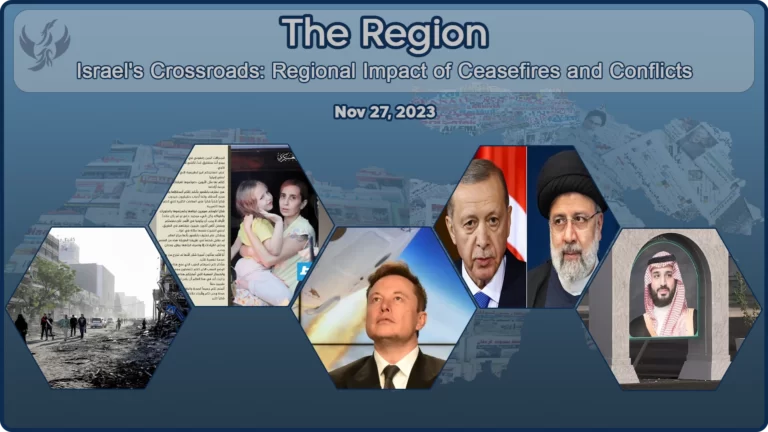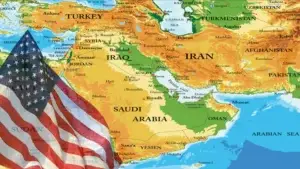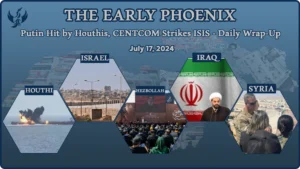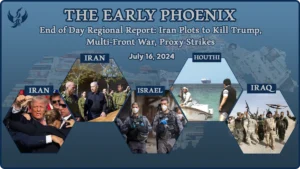Regional Impact of Ceasefire and Conflict
- The U.S. reaffirms its commitment to a two-state solution in the Middle East.
- Israeli Prime Minister Netanyahu and Hamas grapple with the complexities of a ceasefire, including issues around prisoner releases and movement restrictions in Gaza.
- Qatar is involved in Israel-Hamas hostage negotiations, mediating a complex hostage situation and a proposed truce extension.
- The plight of women and captives in Gaza is highlighted, with a focus on the harsh conditions faced by Palestinian detainees and the experiences of Israeli captives.
- Elon Musk plans to visit Israel to address issues of anti-Semitism and Starlink’s role in Gaza.
-
Iran
- Iran showcases its military advancements with the induction of the ‘Deylaman’ destroyer and unveiling of the ‘Fattah-2’ hypersonic missile.
- Former Canadian intelligence officer convicted due to ties with Iran.
- Iran’s internal and regional dynamics are highlighted, including nuclear tensions and media prosecutions.
-
Iraq
- Potential Iranian strategy to target Jordan is unveiled in the context of the Iraq-Jordan border crisis.
- Armed factions disrupt trade and travel at the Iraqi-Jordanian border, indicating a broader strategy potentially coordinated by Iran.
- The U.S. Navy recovers a hijacked tanker near Yemen and evades missiles, with increased naval presence in the region.
- President Biden’s diplomacy is seen as a potential barrier to Saudi-Israeli normalization.
-
Egypt & North Africa
- Egypt seeks new loans from the World Bank amid economic challenges.
- Turkey extends its military presence in Libya, sparking regional tensions.
-
Syria
- Assad’s air defense missile misfires during Israeli airstrikes, causing local disruptions.
- Assad’s delegation to the COP28 climate conference raises questions about his absence and broader political implications.
-
Turkey
- Turkey and Russia advance their economic ties, particularly in energy.
- Turkey navigates complex diplomatic relations, including efforts in the Gaza ceasefire and challenges with the U.S. over military acquisitions.
ISRAEL & PALESTINIAN TERRITORIES
By: The Early Phoenix Team, Ahmad Barbour, Catherine Perez-Shakdam, and Rania Kisar
Israel at a Crossroads: Biden’s Peace Push, Ceasefire Strains, and Musk’s Diplomatic Foray
- Biden Administration Reaffirms Commitment to Two-State Solution in Middle East.
In light of the study on reassessing U.S. strategies in the Middle East, the recent statement by U.S. National Security Adviser Jake Sullivan gains significance. Sullivan confirmed President Biden’s administration’s dedication to a two-state solution for Israeli-Palestinian peace. This commitment aligns with the study’s emphasis on resolving the Gaza conflict through political means and strategic regional cooperation. The administration’s stance also resonates with the study’s call for a balanced approach to Middle Eastern affairs, including the Israel-Palestine issue, which is pivotal for regional stability and U.S. interests.
- Netanyahu and Hamas Grapple with Ceasefire Complexities as Israel Targets Hamas Leadership in Gaza Operations.
Israeli Prime Minister Netanyahu briefed President Biden on potential resumption of military operations in Gaza after the ceasefire, while also considering continued prisoner releases. Concurrently, Hamas is advocating for an extension of the ceasefire, to secure additional prisoner releases.
The temporary truce in Gaza is proving challenging for the Israeli army. Israel, citing security concerns in combat zones, is restricting the movement of Palestinians attempting to return to the northern regions. This restriction is aimed at maintaining Israel’s military effectiveness but is complicated by the return of civilians, increasing the likelihood of unintended harm. There is concern among Israeli officials and analysts that Hamas could use this period of ceasefire to disrupt Israel’s military plans and rebuild its capabilities. Additionally, the terms of the ceasefire, including hostage exchanges, present Israel with operational challenges, amidst fears of losing military advantage and facing global pressure for more comprehensive agreements. The situation is particularly complex in northern Gaza, an area significantly affected by the conflict.
Sinwar, playing a significant role in prisoner exchange decisions, has personally visited Israeli detainees in a tunnel in Gaza, reassuring them in Hebrew about their safety. During this ceasefire, the Israeli military faces challenges such as the return of displaced Palestinians and maintaining military readiness.
Despite temporary ceasefires, Israel’s offensive, especially in Khan Yunis, continues. The IDF and Shin Bet have significantly disrupted Hamas’ strategic capabilities by eliminating five senior commanders.
The ongoing Israel-Hamas prisoner exchange, coinciding with a 4-day truce in Gaza, has seen a rise in Palestinian detainee numbers and fatalities in the West Bank. Military spokesman Avichay Adraee and Chief of Staff Hertzi Halevi have said the Israeli forces will resume their operations against Hamas following the prisoner exchange. Amidst these tensions, a significant UN aid delivery to northern Gaza addresses urgent needs, highlighting the complex interplay of military action, diplomatic negotiations, and humanitarian concerns in the region.
- Qatar Engages in Israel-Hamas Hostage Negotiations During Truce Discussions.
Qatari intelligence officers are currently in Israel, discussing the Gaza truce and a complex hostage situation, despite the lack of official diplomatic relations between the two nations. As part of the proposed extension of the Gaza truce, Israel has set a “one-for-three” release condition, offering to exchange 40 Israelis for 150 Palestinian prisoners. This agreement, mediated by Qatar, Egypt, and the U.S., follows Israel’s release of 78 Palestinian prisoners and Hamas’ release of 26 Israelis and 15 non-Israeli foreigners. Israel has confirmed that approximately 240 captives were taken during a Hamas attack.
The 13 Israeli captives released from Hamas captivity in Gaza after the October 7 attack have recounted their experiences, describing harsh conditions but no physical torture. They reported days without food, limited bathroom access, and frequent relocations, sleeping on benches.
Qatari Prime Minister Sheikh Mohammed bin Abdul Rahman Al Thani, in an interview with the Financial Times, stated that Hamas denies capturing civilians during the recent conflict, attributing this to other armed groups. He revealed that over 40 women and children are still detained in Gaza, but not by Hamas. This statement, however, contradicts the known facts of the October 7 attack, where all forces involved were under Hamas’ command. Israel, in response to Qatar’s claims, provided a list of over 90 captives and indicated readiness to prolong the truce if more detainees are released by Hamas. This development suggests a complex coordination between Hamas and the Palestinian Islamic Jihad Movement in resolving the hostage situation.
An Israeli captive, Daniel Aloni, in a farewell letter to Al-Qassam Brigades, expressed gratitude for the humane treatment received during captivity, acknowledging kindness towards her daughter, Emilia. IDF Spokesperson Rear Admiral Daniel Hagari mentioned gathering information from each captive to understand their individual experiences, though this information will not be publicly released.
- The Harrowing Plight of Women and Captives in Gaza.
In Gaza, amidst the ongoing conflict, pregnant women face a severe health crisis. Out of 540,000 women of childbearing age, 50,000 are pregnant and grappling with inadequate health services. The World Health Organization has raised alarms about increased maternal mortality due to insufficient care, with the war exacerbating the situation, leading to heightened stress, fetal deaths, premature births, and unanesthetized cesarean sections. The release of Maysoon Musa Al-Jabali, the oldest female Palestinian prisoner, along with 33 children in a Hamas-Israel exchange deal, highlights the harsh conditions Palestinian detainees face in Israeli prisons, especially since October 7th, including allegations of beatings, gas attacks, and severe food scarcity.
Conversely, the experiences of 13 Israeli captives held by Hamas in Gaza present a different aspect of the conflict. During their 49-day captivity, they endured isolation, scarce food supplies leading to significant weight loss, and harsh living conditions. Meirav Raviv, a relative of some hostages, shared their struggles, including days without food, long waits for bathroom access, and frequent relocations in small cars. The psychological and physical toll on these hostages was profound, as they were isolated from the outside world until their release under the same exchange agreement.
Both narratives, though distinct in context and perspective, underscore the human cost of ongoing conflicts. The ordeal of the Israeli hostages, detailed by IDF Spokesperson Rear Admiral Daniel Hagari, emphasizes the importance of individual testimonies in understanding the complexities of captivity. The release of these captives marks the end of a distressing chapter for their families, but the broader narrative of captivity and its consequences continues to unfold in the region.
- Elon Musk’s Israel Visit: Addressing Anti-Semitism and Starlink’s Role in Gaza.
As we conclude this week’s analysis, a notable yet distinct development emerges. Elon Musk, amidst allegations of anti-Semitism on his social media platform, is scheduled to meet with Israeli President Isaac Herzog. This meeting aims to tackle the pressing issue of online hate speech. Additionally, Israel’s agreement with Musk ensures that Starlink’s operations in Gaza will proceed only with Tel Aviv’s approval. Musk’s visit, aligning with his public stance against anti-Semitism, unfolds during a temporary ceasefire in the Israel-Hamas conflict, marking a significant, albeit different, point of interest in the region’s ongoing narrative.
======================
IRAN
- Iran Flexes Military Muscle: Unveils Advanced Destroyer and Hypersonic Missile.
Iran’s naval and military advancements, symbolized by the induction of the ‘Deylaman‘ destroyer and the unveiling of the ‘Fattah-2‘ hypersonic missile, underscore its growing regional influence and technological capabilities. The ‘Deylaman’, a 1,400-ton vessel equipped with cruise missiles and capable of engaging multiple targets, bolsters Iran’s presence in the Persian Gulf, Strait of Hormuz, and Caspian Sea, enhancing both economic growth and strategic importance. Concurrently, Iran’s unveiling of the ‘Fattah-2’, capable of hypersonic travel and evading Israeli defenses, along with new air-to-air missiles, marks a significant escalation in military technology. Amid these developments, Iran warns of retaliation against any Israeli escalation, criticizing U.S. support for Israel, and asserting the independence of regional resistance groups. These advancements and statements reflect Iran’s strategic positioning to address potential threats and assert its naval and military prowess in the region.
- Ex-Canadian Intel Officer Convicted, Iran’s Nuclear Tensions, and Newspaper Prosecution.
Former RCMP intelligence official Cameron Jay Ortis has been found guilty of breaching Canada’s secrets law, with ties to international criminals linked to Iran. Arrested in 2019, Ortis faces over 20 years in prison for sharing sensitive information and possessing classified files. This case highlights connections to money laundering and entities associated with Altaf Khanani. In another development, the ongoing Gaza conflict has impacted Western strategies against Iran’s nuclear program. The U.S. and the E3 group, despite concerns raised at the IAEA meeting over Iran’s nuclear activities, have avoided a binding resolution against Iran, wary of exacerbating Middle East tensions. This cautious approach comes amid the unraveling of the 2015 nuclear deal and Iran’s continued enrichment activities. Additionally, Iran’s Etemad newspaper faces prosecution for revealing a confidential document linking the government to volunteer morality guards enforcing the mandatory hijab. This disclosure, following the death of Armita Geravand, echoes the global outcry over Jina Mahsa Amini’s death in 2022, spotlighting the government’s role in morality enforcement. These incidents collectively underscore the complex geopolitical and internal dynamics shaping Iran’s current landscape.
======================
IRAQ
- Potential Iranian Strategy to Target Jordan Unveiled in Iraq-Jordan Border Crisis.
The warning from Iraq’s Foreign Affairs Advisor about a potential regional conflict if the Gaza de-escalation doesn’t lead to a permanent ceasefire is a critical backdrop to the unfolding events at the Iraqi-Jordanian border. Here, armed factions aligned with Iraq’s Popular Mobilization Forces, ostensibly protesting Israeli actions in Gaza, have significantly disrupted trade and travel for two months, demanding entry into Jordan and impacting economic stability and oil supply. This disruption, alongside the Iranian-backed Iraqi Hezbollah Brigades’ announcement of a temporary halt to attacks on Israel and reduced hostility against U.S. forces in Iraq and Syria, suggests a strategic maneuver. This maneuver, aligning with the Gaza truce and following the release of Israeli hostages and Gaza’s humanitarian aid, contrasts with the group’s continued resistance against U.S. forces in Iraq. The convergence of these events, including the frustration of Jordanian officials over trade disruptions, points to a broader, possibly Iran-coordinated strategy. This strategy, aimed at destabilizing Jordan, represents a significant escalation in regional tensions and a direct threat to the stability of Jordan, a key U.S. ally in the Middle East, necessitating immediate attention from U.S. policy officials.
======================
THE GULF REGION & YEMEN
- U.S. Navy Recovers Hijacked Tanker, Evades Yemeni Missiles; Eisenhower Arrives in Gulf.
The U.S. Navy intervened in the hijacking of the Central Park, a Liberian-flagged tanker managed by Zodiac Maritime, in the Gulf of Aden near Yemen. The vessel, associated with Israel, was seized by armed individuals and subsequently recovered by U.S. forces. Concurrently, two ballistic missiles were fired from Houthi-controlled areas in Yemen, narrowly missing a U.S. naval ship involved in the operation. The presence of the U.S. Navy in the region, including the Eisenhower Carrier Strike Group, is part of ongoing efforts to ensure maritime security in these strategic waters. In related news, Yemen’s Houthi rebels have affirmed their decision to close the Red Sea to Israeli ships despite the recent Gaza ceasefire, signaling a continuation of their assertive stance.
- Biden’s Diplomacy and Hamas: A Barrier to Saudi-Israeli Normalization?
President Biden’s suggestion that U.S. diplomacy influenced Hamas’s operations in Israel, aimed at disrupting the Saudi-Israel normalization, intertwines with complex Middle Eastern geopolitics, highlighting America’s significant regional influence. Concurrently, Saudi Arabia proposes a post-ceasefire plan for Gaza, advocating a demilitarized Palestinian state and leading reconstruction, signaling a strategic shift in its stance towards Israel. This shift is underscored by a critical development: “The Saudi Crown Prince, Mohammed bin Salman, has already blocked the phone numbers of Israeli Prime Minister Benjamin Netanyahu and all his aides and envoys,” sources close to the palace reveal. This decisive action emphasizes the Crown Prince’s intention to seek new Israeli partners for normalization after resolving the Palestinian issue, marking a significant recalibration of Saudi-Israeli relations.
Israel’s withdrawal from the Mediterranean Regional Forum, as Saudi Arabia emphasizes the need for a lasting Gaza ceasefire and a credible peace plan, reflects the fluid nature of regional alliances. The Gulf markets’ response to fluctuating oil prices amidst these diplomatic shifts illustrates the tight linkage between regional politics and economic stability. Saudi Arabia’s resilience in market trends amidst geopolitical uncertainties showcases its economic robustness. This intricate web of diplomatic overtures, strategic recalibrations, and economic factors continues to shape the dynamic narrative of Middle Eastern geopolitics, particularly in the context of the Saudi-Israel normalization process and Biden’s regional diplomacy. The recent statements by the Egyptian president, proposing a Palestinian state, and Israel’s rejection of this proposal, further complicate the regional dialogue, indicating the ongoing complexity and sensitivity of these evolving relationships.
======================
EGYPT & NORTH AFRICA
- North Africa’s Economic and Security Dynamics Unveiled.
Despite financial assistance from Gulf countries, Egypt is engaging in talks with the World Bank to secure new loans for small projects and justice system initiatives in the fiscal year 2024/2025. Egypt’s pursuit of additional funding for green, sustainable, and blue financing reflects its efforts to address a growing dollar shortage crisis. Concurrently, the country is exploring the possibility of increasing the $3 billion IMF loan program due to economic challenges stemming from the ongoing Israeli-Palestinian conflict. While discussions of a potential €9 billion ($10 billion) European support package for Egypt are in progress, uncertainties linger regarding the conflict’s economic impact on investments and growth.
In neighboring Libya, Turkey’s decision to extend its military presence by two years has sparked tensions and raised questions about the viability of the Libyan ceasefire agreement. The move, aimed at safeguarding national interests and countering illegal armed groups, faces opposition from parliamentary factions, contrasting with the UN-recognized government’s support for Turkey’s continued military involvement. These developments underscore the complex economic and security dynamics at play in North Africa, where Egypt’s financial negotiations and Turkey’s military extension impact the region’s stability and future prospects.
======================
SYRIA
- Syrian Air Defense Missile’s Comical Misfire During Israeli Strikes.
In a recent series of events that border on the comical, Israeli airstrikes once again targeted Damascus International Airport shortly after its reopening, disrupting operations and leaving Syrian authorities frustrated. This marks yet another chapter in Israel’s ongoing airstrikes on Syrian territory. However, the story took a humorous turn when a Syrian air defense missile, in an epic misfire, managed to miss its Israeli targets entirely and instead struck a major power station in the countryside. The missile’s accidental detour resulted in the disruption of electricity between Yelda and Dif El Shouk. As military engineers scrambled to dismantle the misguided missile, residents were sternly warned against photographing or recording this rather peculiar incident. Meanwhile, Israeli airstrikes also targeted air defense systems in the vicinity of Damascus, causing damage and further disrupting operations at the beleaguered airport. Amidst this chaotic backdrop, Syria’s Foreign Ministry took a more serious tone, condemning the Israeli strikes on its civilian airports as a threat to regional and global security, calling on international bodies to intervene. Furthermore, Russia weighed in on the matter, denouncing Israel’s actions as “provocative and dangerous,” adding yet another layer of complexity to the already strained relations between the two nations in the midst of ongoing regional conflicts.
- Assad’s Mysterious Climate Change Summit Delegation.
In an intriguing turn of events, Assad’s Prime Minister Hussein Arnous will lead the Assad delegation to the COP28 climate conference in the UAE, prompting speculation about President Bashar al-Assad’s reluctance to attend. Arnous’ unexpected leadership comes after a controversial official invitation to Assad, criticized by Amnesty International. While Syria’s delegation, including Environment Minister Hussein Makhlouf, prepares to participate in discussions addressing pressing environmental and climate issues, Assad’s conspicuous absence raises eyebrows. Meanwhile, Assad’s month-long silence following the Israeli attack on Gaza continues to draw scrutiny, with critics highlighting his historical role in Palestinian affairs, which has evolved into a strategic silence that aligns with Iran’s interests. As Assad’s influence wanes, Iranian-backed militias have been surreptitiously facilitating the daily transfer of Syrian oil to Lebanon, sparking concerns. In another revelation, investigations expose the theft of sensitive U.S. weapons and equipment in Iraq and Syria, shedding light on security challenges in safeguarding military assets. Additionally, clashes in western Deir ez-Zor serve as a grim reminder of the persistent ISIS threat in the region, underscoring vulnerabilities within the Assad regime’s forces.
======================
TURKIYE
- Russia-Turkey Economic Ties Flourish as Gas Hub Project Advances. During the 18th meeting of the Russian-Turkish Commission on trade and economic cooperation in Ankara, Turkey and Russia solidified their economic collaboration. Protocols were signed, extending cooperation beyond energy into areas such as rare metal processing and lithium-ion battery-based energy storage devices. Of particular note is the substantial progress made in discussions about a gas hub project in Turkey, aimed at securely delivering Russian gas to Europe, with both nations actively pursuing its realization. Russian Deputy Prime Minister Aleksandr Novak emphasized Turkey’s vital role as a transit corridor and expressed optimism about reaching practical agreements soon. This strengthens their commitment to enhancing economic ties, aiming for $100 billion in bilateral trade, and emphasizing nuclear projects such as the Akkuyu nuclear power plant. Additionally, Russian Ambassador Aleksei Erkhov touched on matters beyond economics, criticizing Western double standards on the Gaza conflict and discussing Russia’s stance on Turkey’s proposed guarantorship for the Israeli-Palestinian conflict and efforts for Turkish-Syrian normalization. Turkey’s robust economic growth was also highlighted by President Erdogan, with exports reaching $254.8 billion in the past year, marking a substantial increase and emphasizing the need for both quantity and quality in future export endeavors.
- Turkey and Iran’s Wild Ride: Hostage Release and Gaza Ceasefire Quest.
In a diplomatic twist, Turkey and Iran have both claimed credit for their roles in securing the release of Thai hostages held by Palestinian militants in Gaza, adding an element of comedy to the situation. While Iran, along with Qatar, alleges its involvement in freeing 10 Thais and a Filipino, Turkey insists that President Recep Tayyip Erdoğan actively played a part in the release of 14 Thai nationals, leaving approximately 20 Thais still in captivity. Amid this hostage drama, Turkish President Erdogan and Iranian President Raisi have united in diplomatic efforts to secure a permanent ceasefire in Gaza, denouncing “Israeli brutality in Palestinian territories.” This aligns with the ongoing four-day truce facilitated by Qatar, Egypt, and the United States. Concurrently, Turkish Parliament Speaker Numan Kurtulmuş called for the establishment of a Palestinian state with Jerusalem as its capital, stressing international protection of Palestinian rights. President Erdogan engaged in discussions with Spanish Prime Minister Pedro Sanchez, emphasizing uninterrupted humanitarian aid to Gaza, while Turkish Foreign Minister Hakan Fidan addressed the Gaza crisis at the Union of the Mediterranean forum.
- Turkey’s Eurofighter Quest While Facing US Tensions.
Turkey finds itself navigating a diplomatic tightrope as it explores the acquisition of 40 Eurofighter Typhoon fighter jets to bolster its fifth-generation fighter fleet, a decision triggered by the US Congress’ halt in the sale of F-16 fighter jets. However, Germany’s opposition looms large, with the UK and Spain attempting to sway their stance. This move reflects Turkey’s pursuit of alternatives amid escalating US geopolitical tensions and uncertainties surrounding F-16 negotiations, potentially challenging Lockheed Martin’s market dominance. Concerns also emerge from Germany’s military deal restrictions and manufacturing uncertainties, complicating Ankara’s Eurofighter proposal. Simultaneously, Ankara recently released Matin Topuz, a former employee of the US Consulate in Istanbul, after a three-year conviction for alleged ties to a terrorist organization strained bilateral relations, highlighting the delicate balancing act Turkey faces in maintaining its international partnerships.
======================
📢 In case you missed it,
📰 The Early Phoenix Nov 24, 2023
📰 The Early Phoenix Nov 23, 2023
📰 The Region November 22, 2023
📰 The Region November 21, 2023
📰 The Region November 20, 2023
Follow the latest news from the American Center for Levant Studies via Google News




